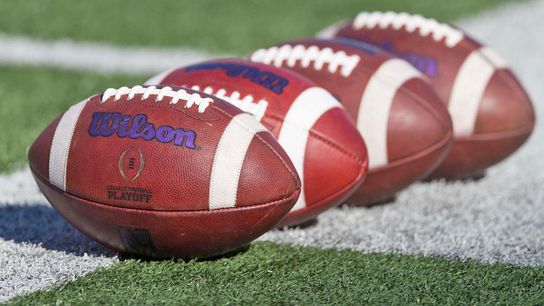The NCAA wants you to know that it's still in charge, it's aware of what's going on, and it might get around to doing something about it.
The Division I Board of Directors on Monday issued "guidance" to schools "regarding the intersection between recruiting activities and the name, image and likeness environment."
In short, the NCAA officially has no problem with enrolled student-athletes striking individual deals to promote local businesses or provide sport instruction, otherwise known as NIL. But it's now letting everyone know that it plans to stop the other type of NIL, colloquially referred to as "Now It's Legal."
The Board did not pass any new rules, but instead notified schools not to be surprised if they're investigated for violating the existing ones -- specifically, rules prohibiting pay-for-play deals that are now frequently used as inducements to enroll at a given school out of high school, to transfer to a given school, or not to to transfer away from a given school.
The guidance was developed by a task force of national leaders with student-athlete opportunity at the forefront of discussions. Specifically, the guidance defines as a booster any third-party entity that promotes an athletics program, assists with recruiting or assists with providing benefits to recruits, enrolled student-athletes or their family members. The definition could include "collectives" set up to funnel name, image and likeness deals to prospective student-athletes or enrolled student-athletes who might be considering transferring. NCAA recruiting rules preclude boosters from recruiting and/or providing benefits to prospective student-athletes.
Here is the actual NIL guidance sent to schools and obtained by @SInow https://t.co/fQhV8WCnbG pic.twitter.com/n7lAtwFy1c
— Ross Dellenger (@RossDellenger) May 9, 2022
Of course, any collective worth its salt its constructed in such a way to provide plausible deniability to the boosters and the players involved.
It's also an extremely open question on if the NCAA even has the legal authority to bust up any collectives, even the ones that explicitly outline pay-for-play inducements to recruits or transfers, given that recent Supreme Court precedent implies the court system could view the NCAA's efforts to enforce its rulebook as an antitrust violation.
The NCAA is moving forward with the understanding that any deals struck over the past 10 months that violated its NIL policy may not be pursuable from an enforcement perspective, but is instead focused on preventing recruits and players from choosing schools based solely on who can pay the most. (Which, in that case, good luck.)
"While the NCAA may pursue the most outrageous violations that were clearly contrary to the interim policy adopted last summer, our focus is on the future. The new guidance establishes a common set of expectations for the Division I institutions moving forward, and the board expects all Division I institutions to follow our recruiting rules and operate within these reasonable expectations," Georgia president and D1 Board chair Jere Morehead said.
As always, stay tuned to The Scoop for the latest.
